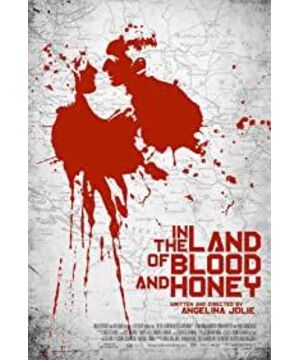The story of "The Land of Blood and Honey" took place during the Bosnia-Herzegovina War. It tells the story of the Serb soldier Danijel falling in love with Ajla, a Muslim woman in Bosnia and Herzegovina. Love that transcends ethnic conflicts, mixed with a sense of national identity, a crisis of trust, and raging wars, blooms a flower of blood on the land of Bosnia and Herzegovina. This is the first work written and directed by Angelina Jolie. As a debut, the audience may not be too demanding, but the film still disappoints in many ways.
"The Land of Blood and Honey" is a movie that tries to look back at the war in Bosnia and Herzegovina in a small way. It demonstrates the helplessness of the war through love and accuses the annihilation of humanity during the war. However, the story of the movie is really pale and lacklustre. It is nothing more than setting the story of Romeo and Juliet in the War of Bosnia and Herzegovina. Coincidentally, the father of the protagonist Nebojsa also happens to be a general. It is as famous as the movie. The end of the story was changed to hatred over love. There is no breakthrough in the narrative technique, and the straightforward narrative makes the 127-minute movie seem extraordinarily lengthy. In addition, the characters in the movie are too thin. The heroine's large number of scenes only float on the surface, and the inner monologue is very few. As an audience, it is difficult for us to glimpse the development process of love and hatred in her heart. In the movie, the heroine returns to the sisters and is determined to be an undercover plot setting. Due to the lack of succession and transformation, it seems out of place, and the hero's love is too straightforward and concise, the credibility is staggering, and the emotional development between the two Relatively obtrusive. Not to mention the main thread that strung up the plot-love was not filmed well, the war scenes were too hard, the genocide was nakedly moved to the screen, especially the scene of the Serb soldier killing the baby, it was too simple and rude. A lot of visual impact makes the soul tired, but the climax of the ending credits is not touching. In this regard, "The Land of Blood and Honey" is really inferior to the "Jinling Thirteen Hairpins", which is also a war theme. At least the emotional rendering of the entire movie in "Jinling Thirteen Hairpins" is gradual, and "The Land of Blood and Honey" ", it seems too deliberate.
If "The Land of Blood and Honey" is just a movie, I think it is still quite satisfactory, but considering the historical facts reflected in the movie, I have to deduct one more star. The reason is that the film is taken out of context and its position is unfair. Like a grand flattery.
War films are not taken by just a single director, because the pain caused by the war is too great. If the director does not follow historical facts and is not familiar with the causes and consequences of the war, and the fate of the characters in the war, the work produced will not only be unfair. , It will let people who remember history have nowhere to release their feelings, and the scars will be uncovered again. The cruelty is tantamount to a massacre of the soul.
In this story written by Angelina Jolie, the Serbs are all male militants who are cruel and murderous. They not only slaughter male Muslims at will, rape Muslim women, torture and kill babies, but also use innocent Muslim women as human bodies. Shield, encircle and suppress the Muslims who fought back. On the other hand, the Muslims in Bosnia and Herzegovina are all women, children, old and young, unarmed, and are obviously disadvantaged. Even the heroine is a weak woman with a paintbrush. One side takes the gun and the other takes the paintbrush, and the powerful and the weaker. At the beginning of the story, Julie tilts the balance subjectively, making it easy to see what is praised or degraded. Indeed, people are deeply shocked by the history of the Serb massacre of 7000 Muslim men. ① But is the complete fact only so?
According to post-war statistics from the Serbs in Bosnia and Herzegovina, only 19% of the Serbs who died in the Bosnian War were soldiers and the rest were civilians. In 1996, a Bosnian Muslim commander admitted in front of a UN peacekeeping force official. He personally killed about 200 Serb residents, while a Muslim commando captured 7,000 Serbian civilians and killed them all. ② Even Srebrenica, which is regarded as the place where the greatest atrocities by the Serbs took place, is not only a tomb of Muslims, but also a cemetery of Serbs: from the outbreak of the civil war in Bosnia and Herzegovina in 1992 to the death of Srebrenica in July 1995 During the Serb capture, at least 3,227 Serb residents died in the entire Srebrenica area. In the city center alone, 446 Serbs were tortured and killed, and as many as 469 Muslim mobs were involved in crimes. And all these atrocities "have all kinds of evidence materials such as text and images." ③ Even on the eve of the Serbs' capture of Srebrenica, the Muslim defenders of Srebrenica were still launching a sneak attack on nearby Serb residents and executed several Serb civilians by "cutting their heads".
Tracing back to the source, the mass murder of Serbian civilians in Bosnia and Herzegovina on March 1, 1992, and the first shot of ethnic cleansing in Bosnia and Herzegovina were the Muslim extremists in Bosnia and Herzegovina. Fiercely opposed, it was the fanatical Muslim militant Izetbegovic who forcibly declared the independence of Bosnia and Herzegovina on March 3, 1992. This war started with the division of nations, and wherever there is a division of nations, there will be Americans. When the Parliament of Bosnia and Herzegovina officially declared independence on March 3, 1992, despite the opposition of the Serbs, the United States and Europe could not wait to grant recognition in April, which triggered this three-and-a-half-year war. The victims of the war were not only Muslims, but the Serbs were equally painful. Bosnia and Herzegovina, once dominated by the Serb population, now has far fewer Serbs than Muslims. Serbs rape women and slaughter babies. Do Muslims show mercy to Serbs? The crushing forces sent by NATO are holding the banner of peacekeeping. Why do they only build safe areas for Muslims and Croats? Don’t Serb civilians need protection? The endless bombing has plunged the entire Sarajevo into the flames of war, and the devastating attacks have just fallen on the Serbs? If the Serb massacre of Muslims is unjust, then NATO's so-called "peacekeeping" is not at all wise. In fact, even the appalling history of the Serb massacre of 7000 Muslim men was revealed in 2002 by a British peacekeeping veteran. In the eyes of this “elite” in the British army, Western countries have shown interest in Bosnia. In the end, the policy of "completely failed." "Military forces could have completely avoided the massacre, but they have never come in handy." ④ In other words, it was the presence of peacekeeping forces and the unfairness to the Serb people. The attitude angered the Serb armed forces, leading to the death of a large number of Muslim civilians and causing a historical tragedy.
Obviously we will not see all the above facts in Angelina Jolie's film. Regarding ethnic conflicts, it is difficult to determine which is right and which is not. Even the residents of all ethnic groups living in the former Bosnia and Herzegovina area do not know how to go back to that period of history, because their hatred for each other came too fast, too unreasonable. So it's hard to say that the error only exists on one side. A historical review requires rational analysis, objective evaluation and fair judgment. And obviously Julie didn't intend to tell this story peacefully, she just saw the history in her eyes, and splashed out such a piece of blood and honey. It is a pity that the film not only failed to melt the iceberg-like barrier between the races of Bosnia and Herzegovina in the past 20 years, but once again aroused national sentiment and was criticized on Youtube and IMDB. Obviously, Angelina Jolie, as a UN Goodwill Ambassador, instead of objectively understanding the historical facts of the war, she has a completely one-sided attitude and completely tilted her position towards her US government. This kind of hiding the truth and one-sidedly restores history. The technique is very irresponsible. If a film is mixed with too many political purposes, people will inevitably doubt the degree of objectivity of the film. No wonder the IMDB audience rating is only 4.2, and even the native American film review site Rotten Tomatoes has a positive rate of only per cent. 57. The US reviews calculated by Metascore averaged only 56 points for the film, and many netizens who had experienced the war in Bosnia and Herzegovina also left a message saying: Julie will never understand the feelings of the war. On the contrary, the film "Borderland", which won the 2002 Oscar for Best Foreign Language Film Award, received rave reviews. The director looked at the war with his sad comedy eyes and produced a classic. The reason for this reputation is still the difference in the director's directing skills and the difference in the interpretation of historical facts.
In the last scene of the movie, the actor Danijel, a Serb soldier, walked up to the NATO peacekeeping force, knelt down in front of them, and said painfully that he was a murderer and a war criminal. In this scene, it is Danijel who truly realized the ferocity of national hatred, whether it was Julie’s own obscenity, or the self-denial of the Serbs that the Americans wanted to see. At the Ball Awards, she received such a controversial nomination for a foreign language film to commemorate her rehearsal and grand flattery to her beloved motherland and great nation.
① In 1995, Serbian forces launched a large-scale offensive against Bosnian Muslims. However, the United Nations and NATO left 50,000 Muslims in the "safe zone" designated by the United Nations-the town of Srebrenica in eastern Bosnia. What's more, in July 1995, the "safe zone" was captured by Serbian forces. In the end, about 7,000 Muslim prisoners of war and men of military age were massacred (including combat deaths), which became the cruelest war in European history since the end of World War II. offense.
②Associated Press, Trebe Viking Mountain, Bosnia and Herzegovina, March 28, 1996.
③ "The Ins and Outs of the "Srebrenica Massacre"", Guangming Daily website, June 24, 2005, http://www.gmw.cn/01gmrb/2005-06/24/content_256955.htm
④The Sunday Times, UK, July 28, 2002.
View more about In the Land of Blood and Honey reviews










